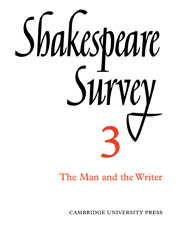Book contents
- Frontmatter
- Studies in the Life and Environment of Shakespeare Since 1900
- Shakespeare’s Deposition in the Belott-Mountjoy Suit
- Shakespeare’s Reading
- Recent Studies in Shakespeare’s Chronology
- Coriolanus and the Midlands Insurrection of 1607
- The Shakespeare Collection in the British Museum
- The Structural Pattern of Shakespeare’s Tragedies
- The ‘Meaning’ of Measure for Measure
- Hamlet and the Player Who Could NOT Keep Counsel
- Unworthy Scaffolds: A Theory for the Reconstruction of Elizabethan Playhouses
- Shakespeare in the German Open-Air Theatre
- Othello in Paris and Brussels
- Shakespeare and Denmark: 1900–1949
- International News
- A Stratford Production: Henry VIII
- The Year's Contributions to Shakespeare Studies: 1 Critical Studies
- 2 Shakespeare’s Life and Times
- 3 Textual Studies
- Index
- Plate Section
The ‘Meaning’ of Measure for Measure
Published online by Cambridge University Press: 28 March 2007
- Frontmatter
- Studies in the Life and Environment of Shakespeare Since 1900
- Shakespeare’s Deposition in the Belott-Mountjoy Suit
- Shakespeare’s Reading
- Recent Studies in Shakespeare’s Chronology
- Coriolanus and the Midlands Insurrection of 1607
- The Shakespeare Collection in the British Museum
- The Structural Pattern of Shakespeare’s Tragedies
- The ‘Meaning’ of Measure for Measure
- Hamlet and the Player Who Could NOT Keep Counsel
- Unworthy Scaffolds: A Theory for the Reconstruction of Elizabethan Playhouses
- Shakespeare in the German Open-Air Theatre
- Othello in Paris and Brussels
- Shakespeare and Denmark: 1900–1949
- International News
- A Stratford Production: Henry VIII
- The Year's Contributions to Shakespeare Studies: 1 Critical Studies
- 2 Shakespeare’s Life and Times
- 3 Textual Studies
- Index
- Plate Section
Summary
The nineteen-twenties, distrustful of ‘enthusiasm’, strove to see Shakespeare as above all the practical dramatist, led to the choice and the manipulation of his stories, to his manner of theatrical speech and character-presentation, by the stage-conditions of his time and the passing fashion of dramatic taste. This approach strengthened our understanding of Elizabethan stage-technique, and it was a useful corrective to the heavily romanticized Shakespeare of earlier years. But when the student of stage-conditions set up as the complete interpreter, the limitations of the approach were obvious enough. The poetic and the dramatic power were only foster-children of the industrious apprenticeship to the stage: the heart of the matter was not to be weighed in a Shakespeare laboratory.
- Type
- Chapter
- Information
- Shakespeare Survey , pp. 66 - 73Publisher: Cambridge University PressPrint publication year: 1950

